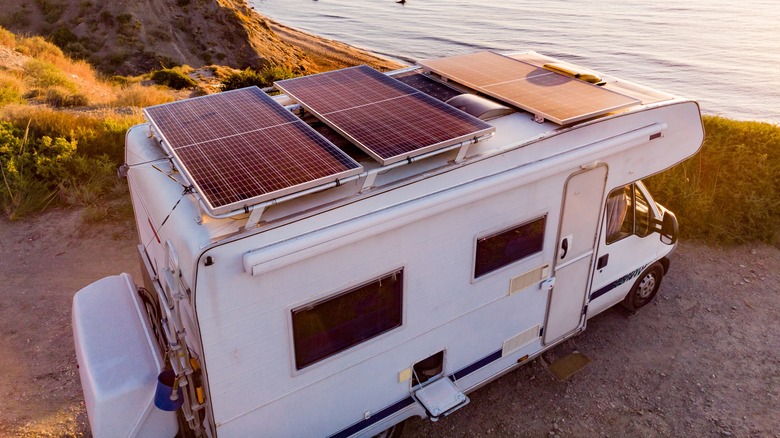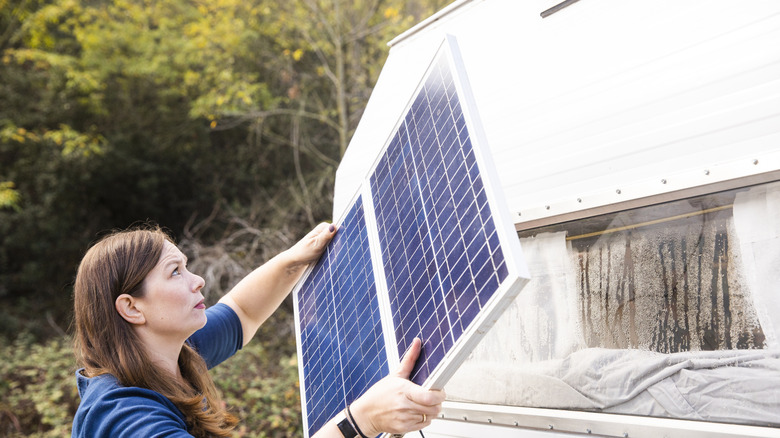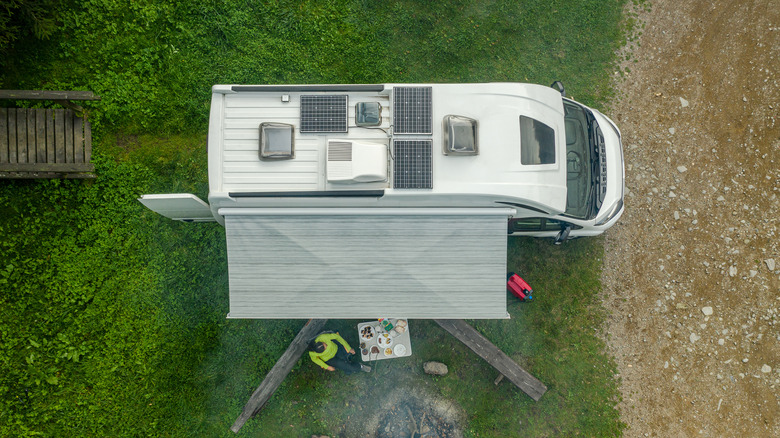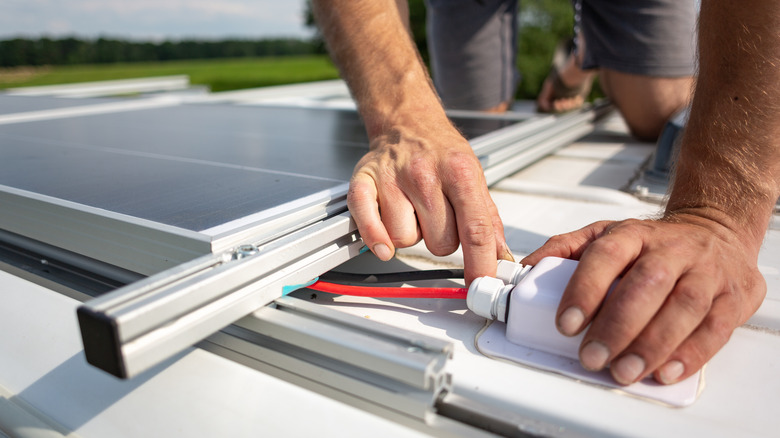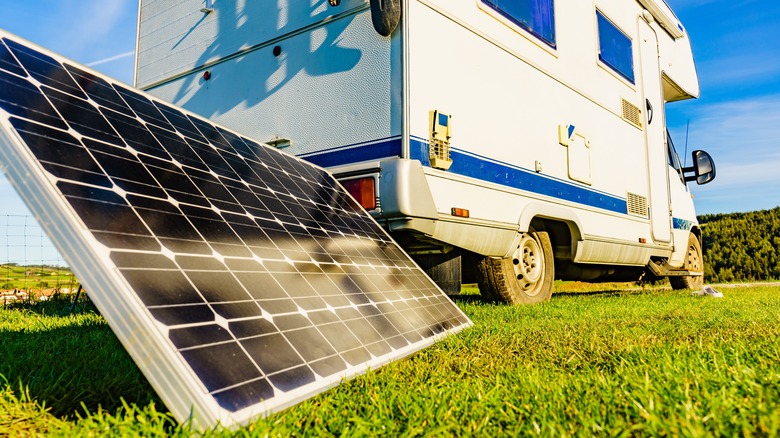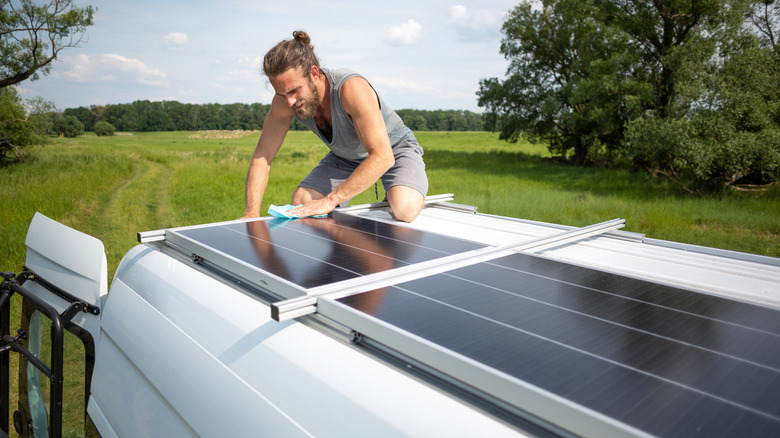What To Know Before Installing Solar Panels On Your RV Roof
If you enjoy driving off the beaten path in your RV, having solar panels installed on its roof can significantly improve your experience. The top-rated solar panels for RVs make you less dependent on traditional power sources, giving you a lot more flexibility when planning road trips. You won't have to worry about docking in campgrounds from time to time. The best part is that since your RV is likely exposed to sunlight for long periods while you're driving, the solar panels can produce sufficient electricity to power up your appliances and devices throughout your trip.
You don't even have to be completely dependent on solar panels for your energy requirements for them to be a worthy investment. In fact, even if you were to use solar power to supplement your power demands from traditional sources, the benefits could be substantial, given that it would allow you to save money and reduce your carbon footprint. That said, while solar panels on your RV roof may seem like a great idea, it's not a decision to be taken lightly. Apart from just the cost, there are numerous other factors to consider before you decide to have them installed on your RV's roof.
Types of solar panels for RVs
There are a variety of solar panels available on the market, but, unfortunately, not all of them work comparably. You'll need to choose the best solar panel for your RV based on its design. For instance, if your RV has limited space available on the roof, the installation might not be as straightforward. However, this is not a dealbreaker; you could make do with smaller panels or a portable solar panel kit that generates less electricity.
When installing solar panels, you can opt for either rigid or flexible panels. The two main types of rigid solar panels are monocrystalline silicon and polycrystalline silicon panels. The former is one of the best options available, and the technology makes use of solar cells that are manufactured from a single silicon crystal. If you decide to go with this type of solar panel, you'll likely need to drill holes in your RV's roof to fix the rack. Polycrystalline silicon is designed by melting different silicon crystals together. This means you end up with a solar cell that has higher impurities, but this sort of system has a lower price point.
Among flexible solar panels, you get to choose between thin-film amorphous silicon and flexible monocrystalline silicon panels. Thin-film amorphous silicon makes use of thin-film technology that is capable of withstanding high temperatures, making this type of solar panel a great option if you drive across hot weather states often. Flexible monocrystalline silicon solar panels are a great option too, since you can stick these panels to your roof and won't have to drill holes to install them.
RV solar panels are affordable, but not cheap
If you have a solar power system installed in your home, you know they can cost up to $20,000, if not more, including all the hidden costs of home solar panels. However, RV solar panels are significantly cheaper. The cost of RV solar panels can vary based on the type of system you go with and how much energy it generates. A small solar panel kit that has limited capacity will be more affordable than a large system. According to MarketWatch, "You can find RV solar panel kits with a capacity of 100 watts (W) to 400 W for less than $600. Portable power stations with alternating current (AC) and direct current (DC) outlets can cost up to $2,000 to $5,000, depending on the brand and capacity."
If you only use your RV recreationally, a minimalistic solar panel setup that powers the water pump, lights, and fans may be sufficient. This type of system, including the solar panel kit itself and batteries, might cost up to $1,500. A mid-tier solar panel power system, which can come in handy if you want to power up any household appliances, might cost $2,000 or upward of that based on the components and capacity you choose. Alternatively, if you decide to go with a full-scale RV solar panel system that will truly allow you to go off-grid by powering up all types of appliances and devices inside your RV, you can expect to pay $5,000 or even more.
If you're not looking to drill solar panels on your roof, a simple portable solar panel kit that supports DC charging could cost around $1,200. Keep in mind that portable solar kits that support AC/DC power outlets might cost between $1,200 and $1,800 or more.
Requirements for installing RV solar panels
RV solar panels work pretty much the same way the solar panels installed on residential properties do. The only difference is that they deliver a slightly more modest output. Regardless of the type of system you install, the photovoltaic cells in solar panels convert the available sunlight into electricity, which you can then use to power the appliances and devices in your RVs. For this entire process to work, numerous components are required, including solar panels, a battery, an inverter, and a solar charge controller.
The solar panels are what contain PV cells — you can either install the panels on the roof of your RV by drilling holes or purchase a portable kit. Keep in mind that you may need to purchase several solar panels based on your energy needs and the wattage per panel. If you have a large RV with a wide roof, you could install residential panels instead of traditional RV panels; this might allow you to get the power supply you need without purchasing too many panels.
Given that your solar panels can only convert sunlight into electricity when there is sunlight available, you might want to purchase a battery to store electricity for nighttime usage. You will also need to purchase a charge controller, which regulates the flow and speed of electricity from the solar panels to the battery, ensuring that the battery doesn't overcharge or suffer any other kind of damage. If you want to use both AC and DC power, you'll need to purchase a solar inverter that converts the energy to alternating current (AC) from direct current (DC). You'll find that this is essential if you plan on powering household appliances, like kitchen appliances and laptops, that typically run on AC power.
Are RV solar panels right for you?
While the fact that RV solar panels can produce renewable energy might make them seem like a solid investment, they might not be the right choice for everyone. Just like there are things you need to consider before installing solar panels on your home, you'll need to consider the downsides and limitations of RV solar panels, in addition to the benefits they offer, before you sink your money into them.
One of the biggest pluses of RV solar systems is their ability to serve as a durable and sustainable power source, reducing your carbon footprint in the process. While this, of course, helps bring down your expenses, it also allows you to explore remote areas freely. Although the initial cost of purchasing and installing all the components needed to set up a working solar power system might seem high, the system should pay for itself over time, considering the long-term savings on electricity.
Having said that, you're only really going to benefit from RV solar panels if there is sufficient sunlight. If you're driving across states that have an overcast climate, your investment might not result in as many savings as you would have hoped. Additionally, the amount of electricity the solar panels can generate is dependent on the number and capacity of the panels you install. So, if your RV has a smaller-sized roof, you may not be able to install as many panels as you require to power up all your appliances efficiently. This might become a concern if you're considering spending a few weeks off-road.
Maintaining RV solar panels
Now that you know what it takes to install solar panels on your RV's roof and how much the installation is likely to cost, let's take a look at what you need to do to maintain the system and how often the solar panels need to be cleaned.
The good news is that there's not much you need to do in the way of maintenance to keep the solar panels working efficiently. If you're driving at a time when there's a lot of wind and dust, you'll have to periodically wipe off the panels since the dust can block the panels from converting sunlight to electricity. Around once every year, you might have to perform a thorough cleaning to remove all the dust, debris, and grime that may have accumulated over the months.
It's also a good idea to inspect the system from time to time for signs of rust or wear and tear. While the components are unlikely to deteriorate or show significant damage quickly, being proactive about inspecting the system can help you take timely action in terms of any maintenance that might be required. If you find that any service is needed, it's best to have an expert take a look at the necessary components.
